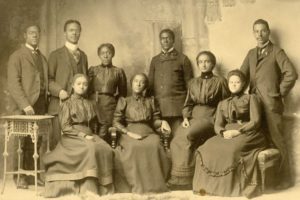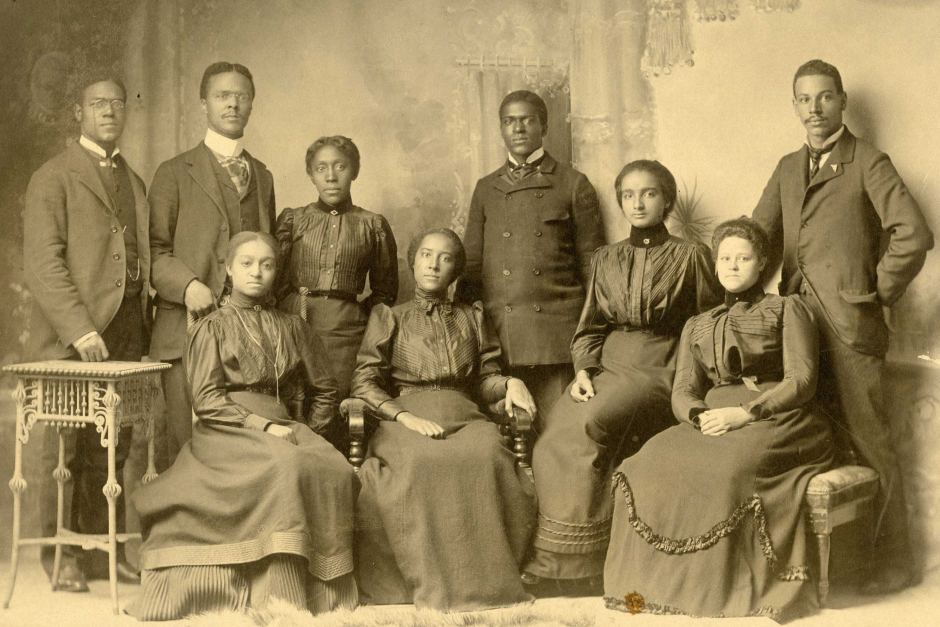
Background of Jubilee Quartets
First Sight of Jubilee in HBCUs
When we think of Jubilee Quartets, we would usually think of a four member group that sings rhythmic tunes. From the book African American Music by Mellonee Burnim, it describes the specific type of Jubilee Quartet within the African American Community. The description states, “…within the context of African American music, a quartet was defined as a vocal ensemble that consisted of a minimum of 4 voices and a maximum of six voices sing in a four-part harmony arrangements…” The main point of this definition is the idea of always having a four-part harmony, which has followed this genre into present day. The sing style was also particular to the genre with there usually being one soloist with the main part and others coming in with backing harmonies. This music genre is also mostly consisting of all male quartets, but there are also female and mixed quartets.
Starting in 1871, the first major Jubilee Quartet came from Fisk University and were lead by George L. White, the choir director and treasurer for Fisk at the time. Seeing that the school needed more money and resources, White decided that it would be a great idea to promote the school through music. Starting with nine students, he created a mixed quartet and they began performing as the “Fisk Jubilee Singers”. Gaining more traction with all their performances, by 1873 they were able perform in Europe and further promote Fisk University. With all the extra money coming in from the quartets, they were put as an official musical group for the school along side the school’s choir. Similar to the whole genre of music, the male only quartet did the most popular for the group and kick started a lot of these students careers into music.
Impact of Jubilee Quartets on HBCUs
Taking inspiration from Fisk University success, many other HBCUs such as Hampton University, Morehouse College, Tuskegee University, and many more started there own quartets. Providing shows for their students and others in there community, Jubilee Quartets became a popular addition to their school’s music department. These schools followed another part of the Fisk Jubilee Quartet, which was rearranging spirituals to fit the four-part harmony of the genre. Songs like “Swing Low Sweet Chariot”, “Steal Away to Jesus”, and “Wade In the Water”, were commonly rearranged by these schools so that each one had their own unique version. The increase in HBCUs using Jubilee Quartets, help to better promote themselves to the public and provide more money to their schools. The perception of the quartets from the surrounding community usually were quite positive, but it was heavily criticized by those in the white community. Seeing quartet style of music as a coming from Europe, some thought it as trying to copy white music and found to be strange. Seeing that most of the HBCU quartets used spirituals from their ancestors and were even sung by some former slaves, it as was very noticeable that the style of quartets that were done by the African American community would be fully different from their white counterparts. This style was completely unique to the community and would continue to help define the presence of black people in music in America.
In conclusion, Jubilee Quartets are a stable piece of music in HBCUs and the black community throughout America. The style is still being used today in many places of higher education and has continue to uplift the these institutions. Jubilee Quartets in the black community specifically have continue to give great performances and give honor to those who have sung the arrangements before them. I hope that HBCUs will continue to use Jubilee Quartets to not only spread their own school’s message, but to also be a positive force for the black community.
Resources:
African American Music an Introduction, by Mellonee V. Burnim and Portia K. Maultsby, Routledge, 2015, pp. 119–122.
Other Post by Author:
Changing with the Times: Gospel Music Throughout History
Introduction Gospel Music has been around since 1920s and continues to be a popular genre until today. Since the start of this genre, it is
Women During Black Movements
Treemonisha is a opera written by a the famous ragtime performer Scott Joplin. This opera focus around the main character of the same name, who
Bringin’ Back Jazz and Funk: Tank and the Bangas
Introduction There are many genres that are popular in today’s music scene. From hip hop to country, most music on today’s charts have a very
My Thoughts on Techno
Introduction: America was originally introduced to Techno music in the 1980s. This version of techno music was created in the city of Detroit
Black Female Connectivity Through R&B Music
Introduction R&B is a genre that has changed naturally over the years. Starting all the way back in the 1940s, R&B has had influences from

Jubilee Quartets Impact on HBCUs
Background of Jubilee Quartets First Sight of Jubilee in HBCUs When we think of Jubilee Quartets, we would usually think of a four member group


